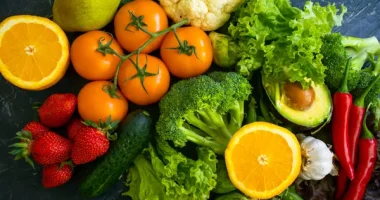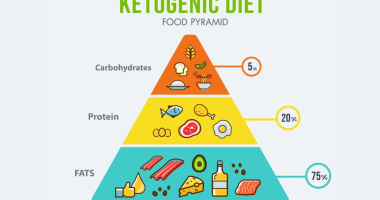Eating certain foods can contribute to the accumulation of belly fat. Before discussing these ten foods that could lead to belly fat, understand that belly fat, also known as abdominal fat, refers to the fat stored around your abdominal organs like your stomach, liver, and intestines. It comes in two main types:
- Subcutaneous fat: This is the fat you can pinch, located just beneath the skin. While not ideal aesthetically, it generally poses less of a health risk than:
- Visceral fat: This deeper fat surrounds your organs and is often referred to as “active fat” because it releases hormones and chemicals that can impact your health. Now let’s delve into “Eating these ten foods could lead to belly fat” The foods include;
1. Sugary foods
Sugary foods are those that are high in added sugars, such as baked goods, pastries, and sugary breakfast cereals. Other foods that may contain hidden added sugars include ketchup, spaghetti sauce, and granola. Processed fruit juices containing high levels of sugar, if consumed in excess, can contribute to insulin imbalance and lead to belly fat. Yogurt, especially low-fat varieties, often contains added sugar to enhance its flavor. Sugar-sweetened beverages like sodas and fruit juices are linked to increased visceral abdominal fat. Eating too much sugar can significantly harm your health and has been linked to an increased risk of many diseases, including obesity, heart disease, type 2 diabetes, and cancer. The American Heart Association recommends that women limit their added sugar intake to 6 teaspoons (25 grams) per day, while men should limit their intake to 9 teaspoons (37.5 grams).
2. Trans fats
Trans fats, also known as trans-unsaturated fatty acids, are a type of unsaturated fat that can occur naturally in some meat and dairy products, including beef, lamb, and butterfat. However, the primary dietary source for trans fats in processed food is “partially hydrogenated oils,” which are formed through an industrial process that adds hydrogen to liquid vegetable oils. Trans fats raise the levels of LDL (“bad”) cholesterol in the blood and lower the levels of HDL (“good”) cholesterol, increasing the risk of developing heart disease and stroke. They are found in many foods, including fried foods like doughnuts, baked goods such as cakes and cookies, and some stick margarines and other spreads. The FDA has taken significant steps to reduce artificial trans fat in the food supply, and in 2015, it determined that partially hydrogenated oils are no longer “Generally Recognized as Safe” (GRAS). As a result, the FDA requires trans fats to be declared on the Nutrition Facts label, and the use of partially hydrogenated oils in foods has been largely phased out. It’s important to limit the consumption of trans fats and replace them with healthier fats, such as monounsaturated or polyunsaturated fats.
3. Milk products
Excessive consumption of milk products, especially high-sugar ones like milkshakes and ice cream, can lead to belly fat accumulation. Dairy products or milk products are food products made from (or containing) milk. The most common dairy animals are cow, water buffalo, nanny goat, and ewe. Dairy products include common grocery store food around the world such as yogurt, cheese, milk, and butter. Milk varies in fat content. Skim milk is milk with zero fat, while whole milk products contain fat. Milk can be broken down into several different categories based on the type of product produced, including cream, butter, cheese, infant formula, and yogurt. Dairy products are consumed worldwide to varying degrees. Some people avoid some or all dairy products because of lactose intolerance, veganism, or other health reasons or beliefs.
4. Alcohol
Excessive alcohol consumption, especially beer, can lead to weight gain around the abdomen, known as “beer belly.” Alcoholic drinks can be high in calories and sugar, which can contribute to weight gain and belly fat accumulation. Some alcoholic drinks, such as sugary cocktails and sweet wines, can be particularly high in calories and sugar. It’s important to consume alcohol in moderation and choose lower-calorie options, such as light beer, wine spritzers, or spirits mixed with low-calorie mixers like soda water or diet soda. Additionally, drinking plenty of water and eating a balanced diet can help mitigate the effects of alcohol on weight gain and overall health.
5. Refined grains
Refined grains are grains that have been significantly modified from their natural composition, in contrast to whole grains. The refinement process involves the mechanical removal of the bran and germ, leaving the endosperm or starchy interior. Examples of refined grains include white bread, white flour, corn grits, and white rice. This process removes dietary fiber, iron, and many B vitamins. While refined grains are often enriched with certain B vitamins (thiamin, riboflavin, niacin, folic acid) and iron, fiber is not added back to enriched grains. Whole grains, on the other hand, contain the entire grain kernel, including the bran, germ, and endosperm, and are a better source of nutrients such as dietary fiber, minerals, and vitamins. The dietary guidance of many countries, including the Dietary Guidelines for Americans, advises replacing refined grains with whole grains. Consuming refined grains, such as white bread and white rice, has been associated with a higher risk of obesity and other health issues. Therefore, it is recommended to prioritize whole grains over refined grains in the diet to promote better health outcomes.
6. Processed meats
According to a study from the Journal of Preventive Medicine and Hygiene, processed meats, such as pepperoni, sausage, deli meats, and bacon, have some major drawbacks for your health. Not only can they increase your risk for colorectal cancer, but they can also increase the inches on your waistline, contributing to belly fat gain. Processed meats are often high in unhealthy saturated fats, sodium, and preservatives, which can lead to weight gain and abdominal obesity. Therefore, it is recommended to limit or avoid the consumption of processed meats and opt for healthier alternatives, such as fresh, unprocessed meats, fish, poultry, and plant-based protein sources.
7. Artificial sweeteners
Artificial sweeteners have been associated with potential effects on fat accumulation, particularly in the abdominal area. Research has suggested that low-calorie, artificial sweeteners may promote fat accumulation, especially in individuals who are already obese. A study presented at the Endocrine Society’s 99th annual meeting indicated that the consumption of low-calorie sweeteners could lead to increased glucose transport into cells, overexpression of fat-producing genes, and the promotion of additional fat formation, particularly in obese individuals. Additionally, a University of Minnesota-led study published in the International Journal of Obesity found that long-term consumption of aspartame, saccharin, and diet beverages was linked to increased fat stores in the abdomen and fat within muscle.
These findings raise concerns about the potential health consequences of habitual, long-term artificial sweetener consumption, particularly in relation to increased body fat. While artificial sweeteners are widely used as sugar substitutes, their potential impact on health, particularly in certain high-risk populations, is a topic of ongoing research and debate. It is important for individuals to make informed choices about their consumption of artificial sweeteners based on the available evidence and their specific health circumstances.
8. French fries and potato chips
A high-sodium diet can lead to weight gain and bloating, especially when that salt isn’t paired with nutritional value. French fries and potato chips are often very high in calories fat and sometimes sodium which could contribute to weight gain if consumed in excess. A 2011 study found that potato chips may contribute to more weight gain per serving than any other food. Additionally, these foods are often high in unhealthy saturated fats and may also contain substances called acrylamides, which have been linked to cancer. Therefore, it’s best to enjoy these foods in moderation as part of a balanced diet to help prevent belly fat accumulation.
9. Ice cream
Consuming ice cream in large quantities can contribute to weight gain and potentially lead to belly fat accumulation. A pint of ice cream may contain a significant amount of calories, sugar, and saturated fat, which, if consumed regularly and in excess, can contribute to increased fat stores, including visceral fat and fat around the waist. The high sugar and fat content in ice cream can lead to the storage of excess carbohydrates as fat, potentially contributing to belly fat accumulation. Additionally, the consumption of ice cream, especially in large amounts, may lead to an increased risk of heart disease and other health complications due to its high saturated fat content.
10. Baked foods
Baked foods, such as cookies, pastries, and many premade desserts, are often very high in added sugars, including fructose. Many baked foods also contain trans fats, which may increase the risk of obesity. A 2021 study found that fructose can reduce feelings of fullness and increase the desire to eat more. Therefore, it’s advisable to consume baked goods in moderation as part of a balanced diet to avoid potential weight gain and the accumulation of belly fat.
Additionally, some commercially baked goods like pastries, cakes, pies, muffins, and cookies may contain trans fats, especially if they are made with partially hydrogenated oils. Commercially baked goods can have an exorbitant amount of added sugar, be highly processed with ingredients you can’t always recognize, and, most importantly, contain trans fat. It’s best to cut out these tempting baked goods as much as you can to avoid more belly fat storage.
ALSO READ: 12 Cancer Fighting Foods You Should Be Eating To Reduce Your Risk









